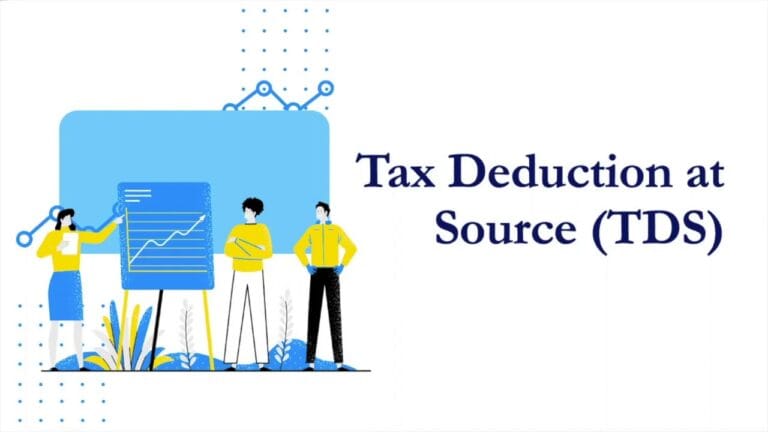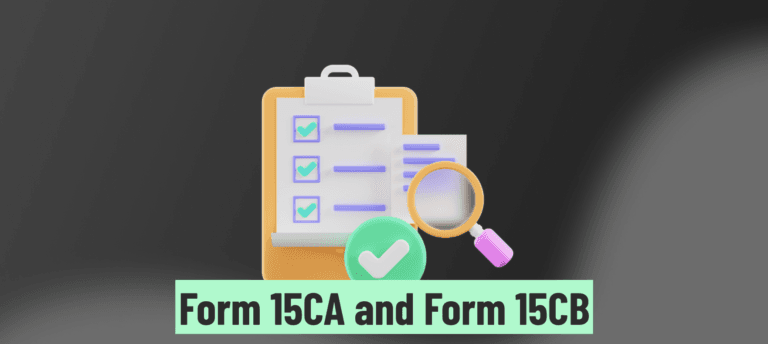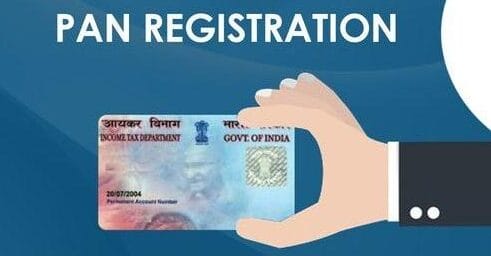Tax Deducted at Source (TDS) deposit is a crucial requirement under the Indian Income Tax Act, 1961, where the deductor (payer) is required to remit the TDS amount deducted from various payments to the government. TDS (Tax Deducted at Source) deposit refers to the process of depositing the tax deducted from the income of the taxpayer at the source itself. Here’s a detailed guide on the TDS deposit process:
Overview
- Tax Deduction at Source (TDS): TDS is a mechanism introduced by the Income Tax Department of India where a certain percentage of tax is deducted by the payer (employer, bank, etc.) at the time of making payments such as salary, rent, interest, etc.
- Deposit of TDS: Once TDS is deducted by the payer, it needs to be deposited with the government. The depositor (the entity deducting TDS) must obtain a Tax Deduction Account Number (TAN) if they are liable to deduct TDS.
- Due Dates: TDS deducted during a month must typically be deposited with the government within a specified due date:
- For TDS deducted in March: Due date is typically April 30th of the following financial year.
- For other months: Due date is generally the 7th day of the following month.
- Challan: TDS is deposited using a Challan 281 (for non-salary payments) or Challan 280 (for salary payments). These challans are available online and can be filled out with details such as TAN, amount of TDS, type of payment, etc.
- Filing TDS Returns: After depositing TDS, the deductor is required to file TDS returns. These returns provide details of TDS deducted and deposited during a particular period.
- Penalties for Late Payment: Failure to deposit TDS on time may attract interest and penalties. The interest is charged as per section 201A of the Income Tax Act, and penalties may also apply for non-compliance.
- Verification and Compliance: It is essential for deductors to ensure accurate calculation, timely deposit, and correct filing of TDS returns to avoid any legal implications.
Steps for TDS Deposit
- Calculate TDS Amount: Determine the amount of TDS to be deducted based on the applicable rates and thresholds for different types of payments (e.g., salaries, interest, rent, etc.).
- Obtain TAN: Ensure the deductor (payer) has a Tax Deduction and Collection Account Number (TAN) issued by the Income Tax Department.
- Deposit TDS Amount: Deposit the deducted TDS amount to the government using any of the following methods:
- Online Payment: Make TDS payment online through the e-tax payment system authorized by the Income Tax Department. This can be done through net banking or credit/debit cards.
- Physical Payment: Visit authorized bank branches and submit a physical challan (Form 281) along with the TDS payment.
- Challan Preparation (Form 281):
- Fill out Form 281 with details such as:
- Tax Deduction Account Number (TAN)
- Assessment Year
- Type of Payment (TDS/TCS)
- Nature of Payment (e.g., salary, interest, rent, etc.)
- Amount of TDS deducted
- Fill out Form 281 with details such as:
- Challan Submission: Submit the filled Form 281 along with the TDS payment amount to designated banks authorized to collect TDS payments.
- Online Verification: After payment, verify the status of TDS payment online on the NSDL (National Securities Depository Limited) website or the Income Tax Department’s portal.
Due Dates for TDS Deposit
- Monthly TDS Deposits: TDS deducted in a particular month must be deposited on or before the 7th of the following month. For example, TDS deducted in May must be deposited by 7th June.
- Quarterly TDS Deposits: For government deductors (e.g., Central and State Government Departments, etc.), TDS is deposited quarterly by the 7th of the month following the quarter end (e.g., April to June quarter by 7th July).
Consequences of Late Payment
- Interest: Interest is levied at a specified rate (currently 1% per month or part thereof) for late deposit of TDS from the date of deduction to the date of deposit.
- Penalties: Non-compliance with TDS deposit timelines may attract penalties under the Income Tax Act.
TDS Certificate Issuance
After depositing TDS, the deductor is required to issue TDS certificates (Form 16, Form 16A, etc.) to the deductees (payees) reflecting the TDS amount deducted and deposited.
TDS deposit is a critical aspect of tax compliance for businesses and individuals responsible for deducting TDS from various payments. Adherence to deposit timelines and accurate reporting ensures compliance with income tax laws and avoids penalties. Businesses should maintain proper records and seek professional guidance to navigate TDS deposit procedures effectively.
At Ujjwal Gupta & Co
We, at Ujjwal Gupta & Co, are dedicated to delivering personalized, high-quality solutions tailored to meet your financial and business needs. With our team of professionals and a client-first approach, we ensure that every challenge is met with expert guidance and strategic insight.
We are dedicated to ensuring your business’s success by providing best service practice available in the industry and that too at a cost effective pricing. Our team of experts is excited to work with you and provide the support you need to thrive in the Indian business landscape.
Our only motive is to create Value for Our Clients and accordingly, have a Client Value System at our Office.
So, let us help you navigate the complexities of finance and compliance, empowering you to focus on what matters most — growing your business. Get in touch today, and take the first step towards financial peace of mind.
The TDS deposit process involves deducting tax at the source on specified payments and then depositing the deducted tax to the government. The deductor must deposit the TDS by generating a challan (Challan ITNS 281) and paying the amount through the Income Tax Department’s online portal or through an authorized bank.
Any entity or person making payments subject to TDS—such as employers, companies, individuals under tax audit, etc.—is responsible for deducting and depositing the TDS to the government. The payer (deductor) deposits the TDS to the government, not the payee (deductee).
The due date for depositing TDS varies depending on the type of payment:
- Non-salary payments: TDS must be deposited by the 7th of the following month.
- For March (last month of the financial year): TDS on salary must be deposited by April 30.
- TDS on property: Must be deposited within 30 days from the end of the month in which TDS is deducted.
To deposit TDS online:
- Visit the NSDL e-Governance website (https://onlineservices.tin.egov-nsdl.com/etaxnew/tdsnontds.jsp).
- Select Challan ITNS 281 for TDS payments.
- Fill in the required details (TAN, Assessment Year, Section Code, etc.).
- Make the payment using net banking or debit card through the authorized bank.
- Upon successful payment, a Challan Identification Number (CIN) is generated, which should be used for filing TDS returns.
Challan ITNS 281 is the challan form used for depositing TDS or TCS (Tax Collected at Source) with the government. It is used for payments under the following:
- TDS on salary and other payments.
- TDS on property.
- TDS on contractor payments. It includes details like TAN, assessment year, the amount of TDS, and payment mode.
Yes, TDS can also be deposited offline by filling out Challan ITNS 281 and submitting it along with the TDS amount at any authorized bank branch. However, online payment through the NSDL portal is encouraged for efficiency and easier tracking.
If TDS is not deposited by the due date:
- Interest will be charged at the rate of 1.5% per month or part of a month from the date of deduction to the date of deposit.
- Penalties can be imposed, with the penalty amounting to the TDS amount not deposited.
- The deductor may also face disallowance of expenses in their tax return, leading to higher tax liabilities.
The penalty for late deposit of TDS includes:
- Interest at 1.5% per month on the TDS amount from the date of deduction to the date of deposit.
- A late fee of ₹200 per day for delayed filing of TDS returns, up to the amount of TDS.
- The Assessing Officer may also impose a penalty equivalent to the amount of TDS not deposited.
No, TDS cannot be deposited quarterly. The TDS must be deposited monthly by the due date (usually the 7th of the following month). However, TDS returns are filed quarterly, summarizing the TDS deducted and deposited during the quarter.
The following information is required to deposit TDS online:
- TAN (Tax Deduction and Collection Account Number).
- Assessment Year for which TDS is being deposited.
- Section code under which TDS is deducted (e.g., 192 for salary, 194C for contractor payments).
- Details of the tax deducted and payable.
- Bank account details for online payment.
Why Choose UGC?

Client Centric Approach
Client is the key driver of our service offerings. Our approach to service offerings is based on a client centric and customized approach. Our specialized teams are a mix of technical and industry experience in order to serve clientele for their specific needs.

Team Work
We have built high performing teams supported by strong work ethic. Our team is a mix of experts, professionals and support staff from technical and varied academic, social and ethnic backgrounds. We believe diversification plays a vital role in motivating the team.

Quick Turnaround
We always endeavour for a quick turnaround time to serve our clientele. We are supported by an experienced and client focussed support teams to offer timely services to our clientele. In case of any business exigencies and time sensitive service requirements, you can always count on us.

Open Communications
We believe that open communication is the core principle in order to demonstrate trust, build long lasting and valuable relationships with clientele. We are committed to ensuring transparency in communication, service offerings and delivery. We provide professional services to our clients.

Client Value System
We value for the Client time and thus, we offer services that are value for money. Quality professional services are provided to our clients, so that they are able to achieve their desired results. We are a quality trademark in the industry and thus, our clients count on us always.

Quality in Delivering Work
Our service offerings are driven by quality and reviews at every level. We strive to provide a qualitative and value-added delivery to our clientele. At all times, we endeavour to provide exceptional client service by meeting client expectations and driving client satisfaction.





















